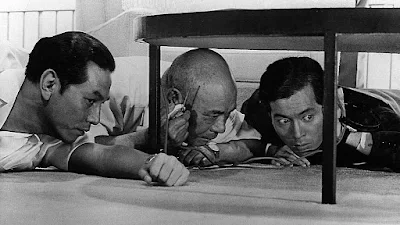The film deals in, as the title suggests, great gulfs of social status, wealth, power between men, in this case between Toshiro Mifune's businessman Gondo and his kidnapper/stalker Takeuchi (Tsutomu Yamazaki). That it starts out in Gondo's house is significant; the mansion with its immaculate furniture and widescreen spaciousness is heaven-- though almost the entire first half of the film takes place inside the house, you never feel claustrophobic because of the expanse, the luxury.
Then the train exchange-- where previously we've been dealing with elevation (or the lack of it) now we experience a mighty sideways thrust across Japan (incidentally, one of the most excitingly staged and shot train sequence in all of cinema). Then a slow descent into hell (the Japanese title of the film is more accurate, I think: Heaven and Hell). Gondo is guided in his journy as Dante was by his angel, or in this case angels-- the police officers experienced in shuttling back and forth between said worlds. The sequence ends in death, literally in hell, as the officers wander about the drug dens and alleyways of the city. This, Kurosawa shows us, is how the other side lives: not only citizens of poverty, like Gondo who once started out as a shoe salesman, but also of self-hate and despair, to which Gondo was strong enough-- and lucky enough-- to never fully succumb.
Then the confrontation. Gondo meets his tormentor, and the man turns out to be--very much like himself, if he was addicted to drugs, had no chances to rise, had to live in a hellhole, oppressed by the shadow of a mansion. As Donald Richie wrote in his excellent book on Kurosawa, Gondo throughout the film is asked to take responsibility and show compassion in ever more impossible and unlikely ways--first, for his business partners (who he rejects); second, for his driver, whose son is taken by mistake (he accepts); and finally, for someone he has not wronged, except indirectly, by building a house on a hill. This final step is so huge and dizzying a move Kurosawa keeps the resolution ambiguous; Gondo is left staring at himself in the glass, pondering his next move.
Before this final image though, even Takeuchi is shown a great and disturbing prospect-- the possibility of redemption. He philosophizes himself into a corner, wondering if perhaps there is a heaven, and if its gates are open to him. He's not afraid of hell, but of heaven he's terrified, perhaps because it means what he's done is not just evil, it's unnecessary-- he could have simply worked on uplifting himself, the way Gondo (who sits before him as an offered example) did, and plans to do again. People will admit to great virtue and given half a chance will admit to great vice; it's not so much what they will admit to as it is the scale and magnitude of the deeds. But no one wants to admit to being small, or mediocre, or worst of all wasted-- no human ego can take that kind of blow.




No comments:
Post a Comment